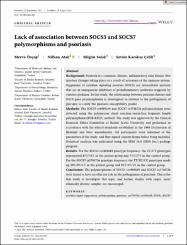Lack of association between SOCS3 and SOCS7 polymorphisms and psoriasis
Citation
Özçep M, Atsü AN, Solak N, Çelik SK. Lack of association between SOCS3 and SOCS7 polymorphisms and psoriasis. Immunity, Inflammation and Disease. (2022): 10(10).Abstract
Background: Psoriasis is a common, chronic, inflammatory skin disease that involves changes taking place as a result of activation of the immune system. Suppressor of cytokine signaling proteins (SOCS) are intracellular proteins that act as endogenous inhibitors of proinflammatory pathways triggered by various cytokines. In this study, the relationship between psoriasis disease and SOCS gene polymorphisms is investigated in relation to the pathogenesis of psoriasis to clarify the psoriasis susceptibility profile.
Methods: The SOCS3 rs4969169 and SOCS7 rs3748726 polymorphisms were detected using the polymerase chain reaction-restriction fragment length polymorphism (PCR-RFLP) method. The study was approved by the Clinical Research Ethics Committee of Bulent Ecevit University and performed in accordance with the ethical standards established in the 1964 Declaration of Helsinki and later amendments. All participants were informed of the parameters of the study, and they signed consent forms before being included. Statistical analysis was performed using the SPSS 18.0 (SPSS Inc.) package program.
Results: For the SOCS3 rs4969169 genotype frequency, the CC/CT genotypes represented 67%/33% in the patient group and 73%/27% in the control group. For the SOCS7 rs3748726 genotype frequency, the TT/TC/CC genotypes made up 89%/9%/1% in the patient group and 91%/8%/1% in the control group.
Conclusion: The polymorphisms of SOCS3 rs4969169 and SOCS7 rs3748726 were found to have no effective role in the pathogenesis of psoriasis. This is the first study to investigate this topic, and further studies with larger, more ethnically diverse samples are encouraged.
Source
Immunity, Inflammation and DiseaseVolume
10Issue
10URI
https://onlinelibrary.wiley.com/doi/10.1002/iid3.695https://doi.org/10.1002/iid3.695
https://hdl.handle.net/20.500.12780/666


















